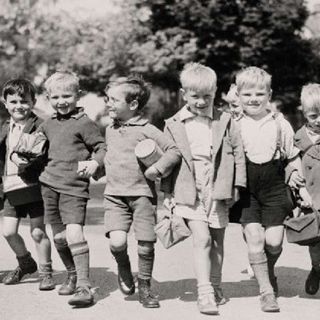
Men’s Testosterone Levels Largely Determined by Early Environment, Not Genes
A taxed immune system in childhood may be the principal factor.

Men’s testosterone levels determine a lot about their overall health; not only does the sex hormone play a large role in sex drive, sexual function, and fertility, it can also impact energy levels, mental health, and chronic health issues like diabetes and cardiovascular disease. Until recently, testosterone levels were believed to be determined largely by genetics, and to a lesser extent by adult lifestyle factors. But a new study challenges that assumption, and illustrates that adult testosterone levels are largely determined by men’s environment during childhood.
The study, led by Durham University and published in Nature Ecology and Evolution, suggests that men who grew up in conditions where there are lots of infectious diseases are likely to have lower testosterone levels in later life than those who spent their childhood in healthier environments.
The researchers collected data from 359 men on height, weight, and other health information, along with saliva samples to examine their testosterone levels. They compared the following groups: men born and still resident in Bangladesh; Bangladeshi men who moved to the UK as children; Bangladeshi men who moved to the UK as adults; second-generation, UK-born men whose parents were Bangladeshi migrants; and UK-born ethnic Europeans. (South Asia’s burden of infectious disease is difficult to estimate, but preventable infection are a major cause of death and disability, and children bear the brunt of exposure.)
The study found that Bangladeshi men who grew up and lived as adults in the UK had significantly higher levels of testosterone compared to relatively well-off men who grew up and lived in Bangladesh as adults. Bangladeshis in Britain also reached puberty at a younger age and were taller than men who lived in Bangladesh throughout their childhood. It’s important to note that despite the disparities in testosterone levels between these groups, none of the groups exhibited testosterone levels at a range that would affect fertility.
The researchers believe the differences are linked to the demands put on the body by fighting infection in environments where boys are exposed to disease or poor nutrition. In high-stress environments, the body may be redirecting its energy towards other survival-related efforts, at the expense of testosterone production.
Male reproductive function is most flexible in early childhood, though it remains somewhat changeable through adolescence, according to the research. However, the study suggests that, in adulthood, men’s testosterone levels are no longer heavily influenced by their surroundings.
Low testosterone levels can result in sexual dysfunction, low energy, and loss of libido, and other recent research has shown low testosterone levels may also lead a significant increase in overall poor health and other, obesity-related chronic health problems, such as diabetes, cardiovascular disease, hypertension, and depression. While the study’s Bangladesh-based participants had comparatively lower testosterone levels, it is unclear whether they had the kind of too-low levels that can prompt negative health effects.
Very high testosterone levels are also dangerous, as they correlate to an increased risk of prostate enlargement and cancer. Taking the results of the study into account should, the researchers say, change screening profiles for these health concerns so that they include an inquiry into where the patient grew up.
Co-author Gillian Bentley and colleagues have also previously found that the environment in which girls grow up can affect their hormone levels, fertility and risk levels for reproductive cancers as adults.
Related


A Year of School Measurably Changes Kids’ IQ
